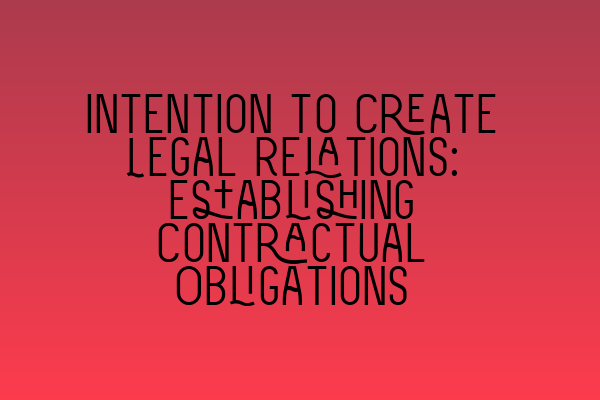Intention to Create Legal Relations: Establishing Contractual Obligations
Intention to create legal relations is a fundamental concept in contract law. It refers to the intention of the parties involved in a contract to be legally bound by the terms and obligations set forth in the agreement. Without this intention, a contract may not be enforceable in a court of law.
When entering into a contract, it is important to establish the intention to create legal relations explicitly or implicitly. This can be done through various means, such as the language used in the agreement, the conduct of the parties, and the circumstances surrounding the contract’s formation.
Expressing Intention to Create Legal Relations
One way to establish the intention to create legal relations is through express language in the contract. This can be achieved by using clear and unambiguous terms that indicate the parties’ desire to be legally bound by the agreement.
For example, using phrases such as “this agreement shall be binding” or “the parties hereby agree to be legally obligated” clearly express the intention of the parties to create legal relations. Such language leaves no room for ambiguity and ensures that the agreement will be enforceable.
Implied Intention to Create Legal Relations
In some cases, the intention to create legal relations can be implied from the actions and conduct of the parties involved. This is particularly true in commercial contracts where it is presumed that the parties intend to be legally bound.
For instance, if you hire a contractor to renovate your house, it is implied that you intend to create a legally binding agreement. Both parties understand that the contractor will provide the agreed-upon services, and you will pay for those services as outlined in the contract.
However, it is important to note that implied intention may not always hold true in certain social or family relationships. For example, if you lend money to a close friend or family member, the court may find that there was no intention to create a legally binding agreement unless there is clear evidence to the contrary.
Factors Affecting Intention to Create Legal Relations
Several factors can influence whether the court determines that there was an intention to create legal relations:
1. Nature of the agreement: The court will consider the nature of the agreement and whether it is of a commercial or social nature. In commercial agreements, the intention to create legal relations is presumed, whereas in social or domestic agreements, the presumption may be that there is no intention to create legal relations.
2. Certainty and completeness of terms: Clear and precise terms in an agreement are indicative of an intention to create legal relations. The more certainty and completeness there are in the contract, the more likely the parties intended to be legally bound.
3. Consideration: The presence of consideration, which refers to something of value exchanged between the parties, is a crucial element in contract formation. It demonstrates that both parties have agreed to give up something in exchange for the other party’s promise.
4. Legal capacity: The court will also consider whether the parties have the legal capacity to enter into a contract. For example, minors or individuals with mental incapacity may lack the ability to form a legally binding agreement.
Conclusion
Establishing the intention to create legal relations is essential for a contract to be enforceable. Whether it is expressed through clear language in the agreement or implied from the conduct of the parties, this intention ensures that both parties are bound by the terms and obligations set forth in the contract.
Understanding the factors that affect the intention to create legal relations can help in drafting effective contracts that stand up to legal scrutiny. If you need further guidance or want to deepen your understanding of contract law concepts, consider exploring SQE Contract Law resources such as SQE 1 Practice Exam Questions and SQE 1 Practice Mocks FLK1 FLK2. To enhance your overall SQE preparation, you can also check out SQE 2 Preparation Courses and SQE 1 Preparation Courses. Stay updated on the latest SRA SQE Exam Dates by visiting SRA SQE Exam Dates.
